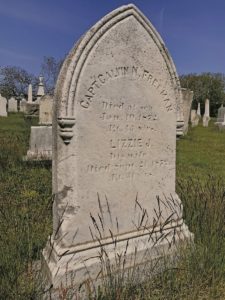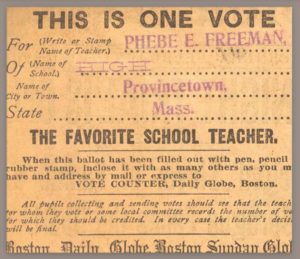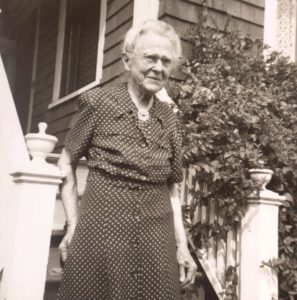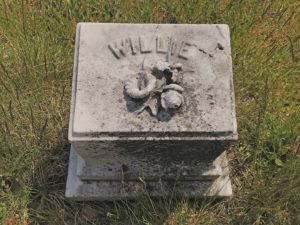The name Freeman looms large in the annals of Cape Cod history. In 1637, Edmund Freeman (1596-1682) was a founder of Sandwich, the Cape’s first town, and later became prominent in the affairs of Plymouth Colony.
Freeman descendants were numerous in Barnstable County, including the Rev. Frederick Freeman (1799-1883) of Sandwich who, in 1858 and 1862, published the two volumes of his History of Cape Cod, a sweeping account of the county and its towns.

Provincetown boasts its share of notable Freemans, too. Sandwich-born Nathan Freeman (1797-1876) — for whom Freeman Street is named — came to Provincetown and distinguished himself as a banker and philanthropist. In 1873 he bequeathed the building that became the town’s original public library. His son, Nathan D. Freeman (1831-1888), was also prominent in business as a partner in Freeman & Hilliard, wholesale fish dealers and ship agents.
Some years before Nathan’s arrival, another Freeman had put down roots here. In 1792, Elisha Freeman (1759-1825) arrived in Provincetown from Orleans with his brothers. An exhaustive analysis of Revolutionary War records thought to belong to five different Cape Cod men named Elisha Freeman concluded that the five terms of service between July 1775 and September 1778 all belonged to the one man who came to Provincetown. Buried in the Winthrop Street Cemetery, Freeman’s grave was marked in 2018 by the Daughters of the American Revolution.
Elisha’s grandson, Josiah Cutter Freeman (1828-1862), was a Navy sailor during the Civil War. He died on board the U.S.S. Cumberland when she was sunk by the C.S.S. Virginia in Hampton Roads. He is honored on Provincetown’s Civil War monument, and the G.A.R. Post 55, chartered in 1884, was named in his memory.

Civic engagement was a hallmark of the Freeman family, but few endeared themselves to the town as Phebe Freeman did over her long life. A beloved teacher in the Provincetown schools, where she nurtured the town’s children for 46 years, she became something of a celebrity early in her career when in 1901 she was a winner of the Boston Daily Globe’s Favorite Teacher contest.
She also served for 24 years as secretary of the Cape Cod Pilgrim Memorial Association, the organization entrusted with maintaining the Pilgrim Monument and Provincetown Museum.
She was a descendant of Mayflower passenger Elder William Brewster, but Phebe was born in San Francisco in 1865. Her father was merchant seaman Calvin Freeman of Provincetown — a grandson of Elisha Freeman. Her mother was Elizabeth Moore of New Brunswick.
Phebe’s story, like so many Provincetown stories, was not without hardship and loss, nor was her father’s without drama and misfortune.

Tucked away in Provincetown’s municipal archives and digitized at the Provincetown History Project is a harrowing personal account by Capt. Calvin Freeman of his perilous 1862 voyage from Boston to Honolulu. Sailing through the Strait of Magellan, clipper schooner Ann Eliza was boarded by indigenous people. By the time they were driven from the vessel, its anchors and chain had been carried off, fires had been set on deck, two crew members had been murdered and three, including Capt. Freeman, were badly wounded.
Capt. Freeman managed to get the Ann Eliza and her valuable cargo of silks underway and put in at the Chilean colony of Sandy Point. There they remained for two weeks while the wounded were cared for and the vessel resupplied and recrewed with three Spanish sailors. Resuming her voyage, the Ann Eliza met with more misfortune before delivering her cargo, losing one of the sailors overboard, losing her jib during a gale, and barely averting disaster on a Honolulu sand bar.
Undaunted, by early 1863 agents for Capt. Freeman and the Ann Eliza were advertising its upcoming passage from San Francisco to the Mexican seaport of Mazatlan.
On Jan. 23, 1861, a year before his voyage to Honolulu, 30-year-old Capt. Freeman had married 19-year-old Elizabeth in Boston. The couple’s first child, Willie, was born in Boston on Oct. 11, 1861. By 1863, the family was living in San Francisco, where daughters Annie and Phebe were born.
Capt. Freeman died at sea of tuberculosis in January 1872, leaving the family destitute. In frail health and with three young children, Elizabeth returned to Provincetown, joining the household of Marshall Adams, whose wife, Mary, was Elizabeth’s sister. In September, Elizabeth died at age 31, and in December 11-year-old Willie succumbed to heart disease.

Raised in the Adams household, Phebe Freeman went to school in Provincetown and graduated from the State Normal School in Salem (now Salem State University). A recommendation from the school’s principal noted that she had “uniformly maintained a very high rank in scholarship and performed her duties with fidelity and success.”
In 1888, Phebe began her long career of “whole-hearted devotion” and “unfaltering loyalty” to the schoolchildren of Provincetown, a devotion that later carried over to guests at the eight-room “tourist home” she operated at 165 Commercial St. Self-reliant and capable, Phebe, who never married, could be seen well into her 80s ascending ladders to paint the exterior of her home. An automobile accident at age 90 slowed her down, but only temporarily. After she sold the guest house, she went to live with her niece in New York, where she died in 1962.



